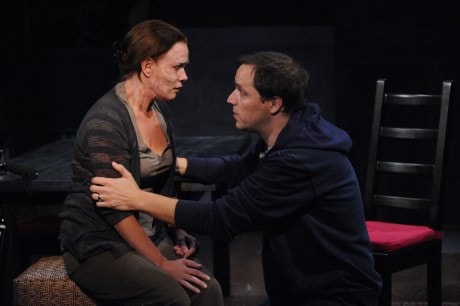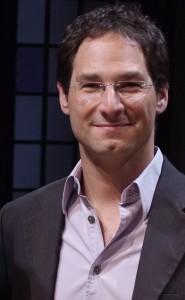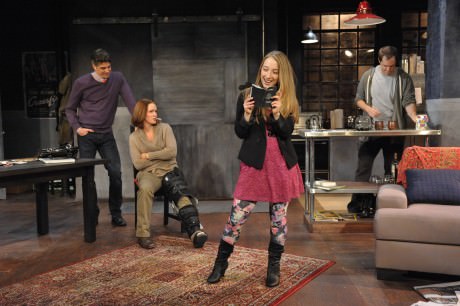Jason Loewith is directing the critically acclaimed production of Time Stands Still at Everyman Theatre. Jason talks about his vision for the production, and how his cast and design team brought his vision to life.
Joel: Why did you want to direct Time Stand Still at Everyman Theatre?
Jason: Such a great story… such a powerful story. And I’ve wanted to work at Everyman for years – Vinny has asked me to direct there since I got to DC, and schedule conflicts kept getting in the way. So finally last year I said to him, “I wanna work with you, let’s do it, I’m not taking anything else til we talk.” And I’m so glad, because Margulies is such a master craftsman, and the folks who work at Everyman are among the kindest and most generous – and most professional – I’ve ever worked with.

How did the performing space at Everyman Theatre influence your directorial choices?
I was very lucky to get to work with Dan Ettinger, who has designed umpteen sets in that space and knows how it works – how it has to work – better than just about anyone. But it was bittersweet for the company, knowing it was almost their last show in that space. It’s a challenge, to be sure, but I had excellent guides.
How would you describe Donald Margulies’ script for Time Stands Still? What is it about Donald Margulies’ writing that makes Time Stands Still such a powerful and emotional experience.
Well as I said, he’s a master of the craft – he weaves character, story, theme and dialogue so effortlessly it’s a bit miraculous. I don’t know any other living writer who can so confidently and passionately build a well-made-play that feels fresh and alive.
They’re unforgettable characters, aren’t they? Completely removed from my everyday life, but utterly familiar. That’s the magic of a Margulies script. And actors LOVE working on this kind of text. Every rehearsal, every performance, it reveals something greater and deeper about the characters they inhabit.
And finally, thematically – you know, I first read the play and thought it was such a fantastic investigation of the politics of war, the politics of witness, and the politics of liberal complacency – we go to the theater and see some play about people far away, pat ourselves on the back for being so good and socially conscious. I hate that crap. And here was Margulies really asking serious questions about do-gooder complicity: what does it matter how much you care about injustice if all you do is go to the theater and watch actors tell you stories about injustice, or listen to those stories on NPR and send a check? The play asked that question of me as I read it. Sarah risks her life to bear witness to atrocities halfway around the world; I shake my head and write a check for fifty bucks.
But on further reading you think about the fabulous character of Mandy, who’s just as much the conscience of the play as Sarah. It’s the play’s most magnificent hat trick, right? You have no respect for Mandy when she walks in the door in Act I as a political being. But she sorta utters the most provocative line of the play in Act II: “There’s so much beauty in the world. But you only see misery. Both of you.I wish you’d just let yourselves feel the joy, y’know. Otherwise, what’s the point?” So suddenly – wait, how engaged do I need to be to walk nobly in the world? Given my privileged status in this great country, what’s my responsibility to others, and what’s my responsibility to myself? What’s my responsibility to beauty and those I love? The question we started with on day one of rehearsal was, “How do I walk nobly in the world?” And I think that’s the deepest question in the play.
And then, the joy as a director of falling into the play’s dense emotional thickets. These are people afraid to be vulnerable, and boy, do I relate to that! I was hooked by the emotional journey Sarah and James try but ultimately fail to take. So politically, emotionally – I just dig the whole banana.
What impresses you most about the performances that James Whalen, Beth Hylton, Nicole Moore, and Eric Messner give?
These guys are a well-timed machine. Beyond the really courageous performances coming from Beth and Eric – and trust me, they went there, they’re astonishing – but this cast deserves an ensemble award. They are tight. They are funny, attuned to each other, they adore each other onstage and off, and they find the humanity in every breath, every gesture, every word. Could NOT be happier with this cast.
Your designers create some wonderful effects. What contributions do Sound Designer Veronika Vorel and Lighting Designer Jay Herzog make to the production?
Well, Veronika and Jay do huge work setting the tone for the audience – how you leave a scene, how you enter a scene, that’s all so important. You know the feeling of that rainy afternoon in Act Two when Sarah comes home shattered from her flashback. You recognizing the yearning when the transition music starts after their love scene… Veronika by the way is a star, a total rockstar.
What have you learned about yourself as a director working on Time Stands Still?
Each time out I learn to trust myself a little more, my instincts… the importance of building a room where everyone can have the right answer, and I can be wrong without losing face. And I’m getting better at choosing my collaborators carefully – I’ve screwed up mightily a couple of times, and that’s never, ever going to happen again.
What scene or scenes have received the most audience reaction and have you been surprised by that reaction?
With the exception of cellphones – what is with Baltimore audiences and cellphones? It’s like a plague – I’ve been most surprised by the silence and stillness through the dramatic scenes. (Thrilled, of course, by the peals of laughter otherwise). The gasps in Act II when Jamie nearly causes Sarah to fall – fabulous. And Beth will tell you that she can always tell whether it’s a Sarah or Mandy house based on the audience reaction to their conversation about having motherhood.
Did you bring any personal experiences that helped influence some of your directorial choices and decisions for this production?
Well, sure, but hard to pin down. I’d like to think that, after 8 years in a committed relationship, I understand a lot about vulnerability and what happens when you can’t make yourself vulnerable – and this play traverses that territory a lot.
The last time I interviewed you was when The Studio Theatre produced a fantastic production of your musical Adding Machine in 2009. Have you worked on another musical since then – either adapting it or directing it? Is there another novel that you would like to adapt for the stage?
The good news is that I’m hard at work with Chris Youstra (who music-directed that Adding Machine production) on my first kids’ musical: Big Nate: The Musical for Adventure Theatre/MTC next spring. Writing about 5th Graders is a welcome change from writing about 40-year-old losers. And Chris is dreamy to work with, so we’re having a great, great time.

Josh and I have pitched a musical adaptation of some Thornton Wilder shorts around to a few places – we’ve got the estate on board, and I’m sure you know that Tappan Wilder lives in the metro area – but no traction, I surprised to say. So until that hits, I’m digging into Big Nate.
My next “play” play – if I can find the time to get to it, or a commission to do it – is about the most famous librettist most people have never heard of: Lorenzo Da Ponte. He wrote the librettos for Mozart’s Don Giovanni, Cosi Fan Tutte, and Figaro. Born a Jew, became a Catholic Priest who sidelined as a musical entertainer at a whorehouse, was run out of town by the authorities in Venice, Vienna and London, and ended up as a grocer in New York City. Buried in Queens, but they lost the body when they were tearing up the ground for a runway at JFK. No joke. So I’m trying to pull the play out of Da Ponte’s astonishing, nutty life.
DC Theater Arts’ reviewer Amanda Gunther said this about your work on Time Stand Still: “Director Jason Loewith achieves perfection of dramatic tension in this production by honing and finely tuning moments of silence and conflict among the actors. Loewith brings a talented cast of four to the stage, each fitted like a hand to an evening glove with their character for moments of volatile compassion that erupt with a fierce force throughout the show. He guides his actors through a series of emotional mountains; making every build from moment to the next increase exponentially with emotional intensity. There are no flat moments in this production and the interactions between the characters are always driven with clear intentions and purposes.”
Do you agree with her? And how did you accomplish this? How did you keep the intensity ‘in check’ during the almost 2 hour production and not have it overpower the story?
Wow, you know, if I could tell you I’d be the hottest director on the planet! I gotta hand it to the instincts of these actors – which were never once false – and to the Margulies magic. I’m not just being humble here. Look at the script. The rhythm is built in the language. When to jump on someone else’s line. When to shout. When to be quiet. I said it on the first day of rehearsal: if we’ve cast this play right (and thanks to Vinny and Kyle, we did), then my job is to just get out of the way for the next five weeks.
You had just moved from Chicago to DC when I interviewed you, so now that you have been here for 3 years, what impresses you about the DC Metro area (including Baltimore) theatre community?
I’m going to quote myself from a piece I just wrote for TheatreWashington:
“I moved to DC four years ago to become Executive Director of NNPN – an alliance of theaters across the country that champions the development, production and continued life of new plays – and have witnessed an extraordinary upsurge in the dynamism and energy behind the new-play scene here. Of course, NNPN’s Core Member in town, Woolly Mammoth, has been at the vanguard of this work for years. But 2009 saw NNPN’s arrival, along with the establishment of Arena’s New Play Institute; in 2010, Studio’s new leadership began boldly claiming world-premiere territory; Signature blew me away in 2011 with its new-musicals rep; Theater J’s Locally Grown Festival energized us in 2012… and that’s all in addition to places consistently championing new work like Source, Rorschach, Theatre Alliance, Inkwell, Page to Stage, the Fringe, GALA… I could go on and on. Back in January, the Post posed the question: “A Wow Decade: Now What?” I’m hoping the answer is “The Playwright Decade.”

What’s next for you after Time Stands Still?
For a big change of pace, I’m currently directing a show at Georgetown University – Caryl Churchill’s Far Away to launch their “War and Peace” season. It’s lots of fun being back in the saddle with student actors. And after that, workshopping, and rehearsals for Big Nate.
What do you want audiences to take with them after seeing Time Stands Still at Everyman Theatre?
Questions!
Time Stands Still plays through Sunday October 7, 2012 at Everyman Theatre – 1727 N. Charles Street in Baltimore, MD. Tickets are available for purchase by calling the box office at (410) 752-2208 and are available online.
Read Amanda Gunther’s review of Time Stands Still on DCMTA.





